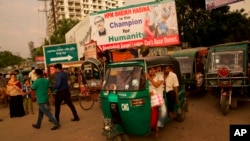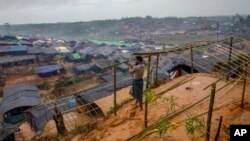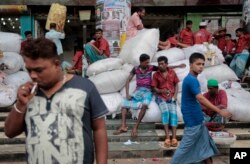They had seen the images of Rohingya Muslim refugees arriving hungry and exhausted after traveling days without food to reach Myanmar’s border with Bangladesh. They had heard the stories of gunshot wounds and midnight escapes from angry mobs and soldiers.
So when the rickshaw pullers, tea stall vendors and other villagers in northern Bangladesh’s Mymensingh district were asked to give, they did — in days raising $10,000 to donate to hospitals and refugee camps helping those who fled in what is now Asia’s largest refugee crisis in decades.
“They came forward with whatever they had, whatever they could give us,” said Mohammad Abdullah-al-Kafi, who helped collect the donations and then traveled to a refugee camp to hand them out. “I could not hold my tears when we got there and saw their suffering. We cried, and they cried as we distributed money.”
Great sympathy and some worry
The sheer need of the Rohingya Muslims has inspired similar grassroots campaigns across Bangladesh, a Muslim-majority nation in which there is great sympathy for the Rohingya’s tales of persecution and abuse in largely Buddhist Myanmar. The government also has stepped up to provide aid, including building more camps to house the some 500,000 refugees who have arrived in just seven weeks, fleeing what the United Nations has described as “textbook ethnic cleansing.”
Some in this impoverished and overpopulated nation, however, have begun to worry that the staggering influx of people could sap Bangladesh’s resources and push the economy, and those already struggling to compete in it, to the brink.
“We are glad to shelter them for the sake of humanity,” said Mohammed Zakaria, who cheered Prime Minister Sheikh Hasina at Dhaka’s international airport upon her return this month from the U.N. General Assembly in New York. “But when I think deeply, I feel uncertain. Is it good for my country? Is it OK? I don’t know.”
Hasina has played down such fears and said that if her country has the ability to feed its 160 million citizens, surely it can find food for less than a million more.
“If necessary, Bangladeshis will eat one full meal a day and share the rest with Rohingya,” she said last week.
Nation impoverished
Still, the humanitarian effort has come at a steep financial cost for Bangladesh, where nearly a third of people live in poverty on less than $2 a day. The country had been sheltering hundreds of thousands of Rohingya refugees who had fled earlier rounds of violence in Myanmar, and the new arrivals quickly pushed existing refugee camps along the border beyond capacity.
United Nations representatives in Dhaka said last month that handling the Rohingya crisis would require at least $200 million over the next six months, but since then, the number of Rohingya arrivals has increased by another 100,000.
“The figure we get from the U.N. is huge, and only a portion is coming from aid agencies and international community,” said economist Khondaker Golam Moazzem, research director at the independent think tank Center for Policy Dialogue. “What will Bangladesh do for the rest?”
Expenses, concerns mount
It’s unclear exactly how much Bangladesh has spent sheltering the Rohingya, but the government has said the forests it cleared for new refugee camps were worth $18 million alone.
The worry is making its way to the streets of Bangladesh. While some are nervous about security and concerns that some Rohingya could be involved in terrorism, the greater fear is economic. There is anxiety that if the Rohingya stay they could take jobs from Bangladeshis.
“If a Bangladeshi charged 10 takas for a work, they will do that work for 5 takas and we will be in more trouble,” said businessman Wasim Iftekhar.
Another businessman, Robiul Islam Palash, shared similar concern.
“From the economic perspective, the Rohingya Muslims will not be able to join any workforce” officially, he said. “We will not be able to ensure their food, clothing, housing and medical facilities. What we can do is help them temporarily, but I don’t think this is a permanent solution.”
Paramedic Mohammed Ali Siddiki was blunter in his assessment, saying ultimately the Rohingya would have to return to Myanmar.
“Otherwise, chaos could break out,” he said.
Rohingya must go home
The prime minister has insisted that the current situation is only temporary, and demanded that Myanmar allow the Rohingya to return peacefully to their homeland in Rakhine state. Myanmar has assured Bangladesh that it is working on a return policy, but it has given no timeline or details about when or how that will happen.
Allowing the Rohingya back into the country would seem to undercut Myanmar’s main assertion: That there is no such ethnic group as Rohingya and those living in the country have illegally migrated from Bangladesh.
Despite the uncertainty about what the future holds, everyday Bangladeshis continue to pitch in. From villages to mosques to schools, citizens have been collecting everything from cash to food to candles to spare clothing to distribute to the refugees.
“My daughter was very happy to donate the goods as her teacher explained the plight of the Rohingya to them,” said Shushama Chowdhuri, after her daughter came home from her third-grade class. “She told me many children like her are suffering there. We must help.”






